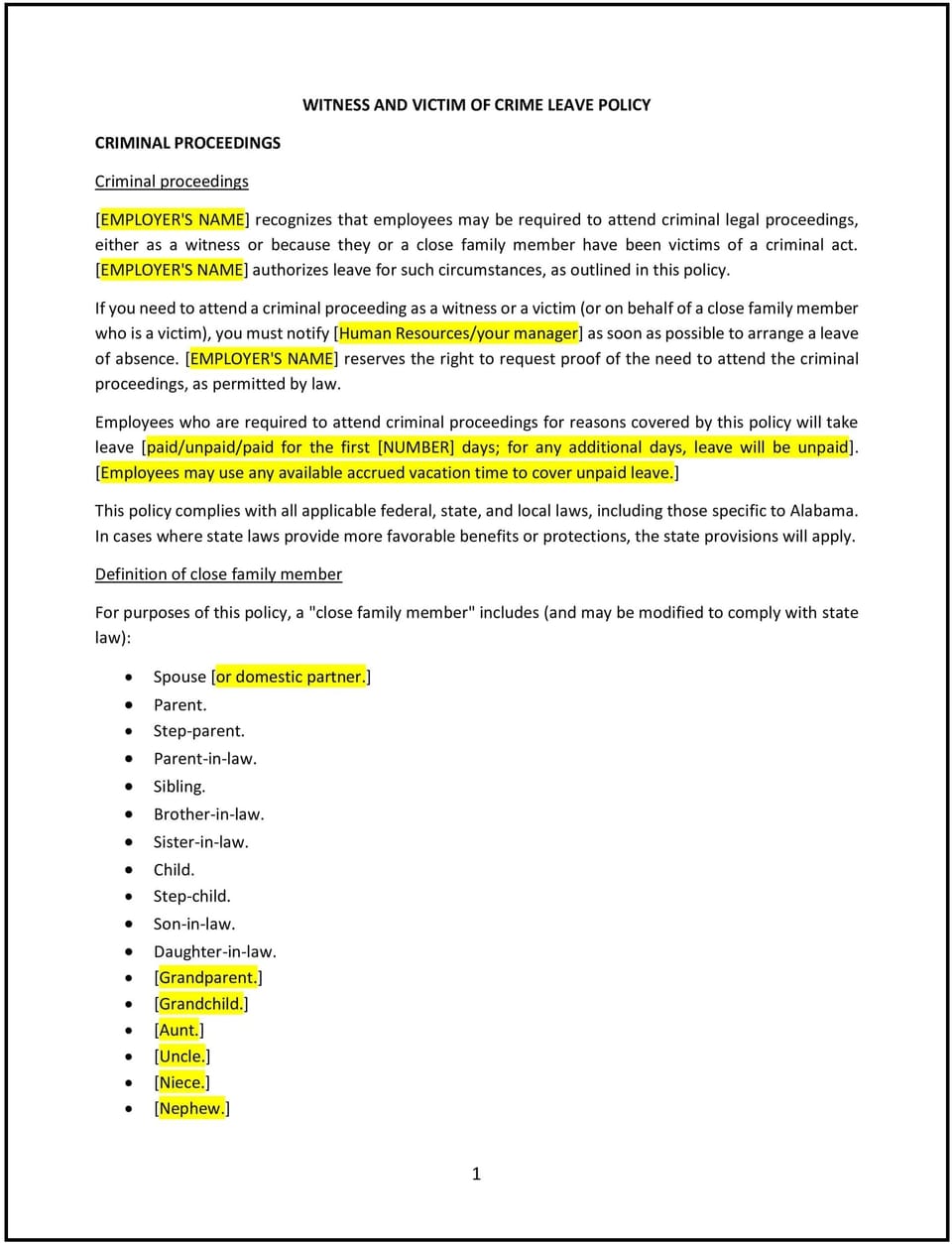Witness and victim of crime leave policy (Alabama): Free template

Witness and victim of crime leave policy (Alabama)
A witness and victim of crime leave policy provides guidelines for employees needing time off to participate in legal proceedings or address matters related to being a victim of a crime. For SMBs in Alabama, this policy ensures employees are supported during challenging circumstances while maintaining compliance with applicable laws.
This policy outlines eligibility, notice requirements, and expectations for employees and employers, creating a structured approach to managing leave requests.
How to use this witness and victim of crime leave policy (Alabama)
- Define eligibility: Specify that employees may request leave if they are victims of a crime, witnesses required to testify, or otherwise involved in legal proceedings.
- Clarify notice requirements: Require employees to notify their manager or HR as soon as possible, providing supporting documentation, such as a subpoena or court notice.
- Address paid vs. unpaid leave: State whether this leave is paid, unpaid, or covered by accrued PTO, depending on company policy and the nature of the leave.
- Outline return-to-work expectations: Include guidelines for employees to communicate their return-to-work plans after completing their legal obligations.
- Promote confidentiality: Ensure that information related to the leave is handled confidentially to protect the employee’s privacy.
Benefits of using a witness and victim of crime leave policy (Alabama)
This policy helps SMBs balance employee support with operational needs. Here’s how it helps:
- Demonstrates empathy: Shows support for employees dealing with legal or personal challenges, enhancing workplace morale.
- Ensures compliance: Aligns with Alabama laws, such as protections for victims and witnesses in certain legal proceedings.
- Maintains productivity: Provides a clear framework for managing absences and planning workload adjustments.
- Reduces conflicts: Minimizes misunderstandings by setting clear expectations for both employees and employers.
- Builds trust: Strengthens the employer-employee relationship by offering support during difficult times.
Tips for implementing a witness and victim of crime leave policy (Alabama)
- Communicate availability: Include this policy in the employee handbook and highlight its availability during onboarding or training.
- Provide clear instructions: Ensure employees know how to submit leave requests and the documentation required for approval.
- Offer flexibility: Accommodate varying durations of leave based on the employee’s legal obligations and company resources.
- Address overlapping policies: Clarify how this leave interacts with other leave types, such as PTO or unpaid leave.
- Regularly review compliance: Update the policy to reflect any changes in Alabama laws or company priorities.
Q: Who is eligible for witness and victim of crime leave under this policy?
A: Employees involved as witnesses in legal proceedings or victims of crimes requiring court appearances are eligible for this leave.
Q: Is this leave paid or unpaid?
A: This depends on company policy. Some SMBs may provide unpaid leave or allow employees to use accrued PTO to cover the time off.
Q: What documentation is required to request this leave?
A: Employees should provide supporting documents, such as a subpoena, court order, or official notice, when requesting leave.
Q: How should SMBs handle confidentiality for leave requests?
A: Information about the leave, including its purpose, should be kept confidential and shared only with authorized personnel.
Q: Can this leave be extended if legal proceedings take longer than expected?
A: Yes, extensions may be granted at the employer’s discretion, depending on the situation and operational needs.
Q: How does this policy align with Alabama state laws?
A: Alabama law provides certain protections for employees involved in legal proceedings, and this policy helps ensure compliance with those requirements.
This article contains general legal information and does not contain legal advice. Cobrief is not a law firm or a substitute for an attorney or law firm. The law is complex and changes often. For legal advice, please ask a lawyer.


